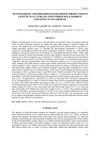 53 citations,
January 2006 in “The Journal of clinical endocrinology and metabolism/Journal of clinical endocrinology & metabolism”
53 citations,
January 2006 in “The Journal of clinical endocrinology and metabolism/Journal of clinical endocrinology & metabolism” Reduced AR gene methylation may cause early pubic hair growth in girls.
 51 citations,
January 2003 in “Hormone Research in Paediatrics”
51 citations,
January 2003 in “Hormone Research in Paediatrics” Hormones and their receptors, especially androgens, play a key role in hair growth and disorders like baldness.
 82 citations,
September 2008 in “Journal of Investigative Dermatology”
82 citations,
September 2008 in “Journal of Investigative Dermatology” EDA2R gene linked to hair loss.
 98 citations,
February 2007 in “Seminars in Cell & Developmental Biology”
98 citations,
February 2007 in “Seminars in Cell & Developmental Biology” Androgens can both stimulate and cause hair loss, and understanding their effects is key to treating hair disorders.
 45 citations,
April 2018 in “Nature Reviews Urology”
45 citations,
April 2018 in “Nature Reviews Urology” Male genital development is driven by androgen signaling and understanding it could help address congenital anomalies.
 24 citations,
January 2021 in “Dermatologic Therapy”
24 citations,
January 2021 in “Dermatologic Therapy” Platelet-rich plasma (PRP) is a safe and potentially effective way to treat hair loss, especially when combined with minoxidil.
 21 citations,
March 2019 in “Critical Reviews in Clinical Laboratory Sciences”
21 citations,
March 2019 in “Critical Reviews in Clinical Laboratory Sciences” The androgen receptor is a promising target for breast cancer treatment, especially in triple-negative cases, but more research is needed for personalized therapies.
 19 citations,
February 2012 in “International Journal of Urology”
19 citations,
February 2012 in “International Journal of Urology” In Japan, sex reassignment surgery for gender identity disorder faces challenges and needs better medical support and education.
 18 citations,
January 2013 in “Postepy Dermatologii I Alergologii”
18 citations,
January 2013 in “Postepy Dermatologii I Alergologii” Puberty often causes skin issues like acne and excessive sweating, and treatments require patience as results may vary.
 12 citations,
December 2012 in “Current Drug Targets”
12 citations,
December 2012 in “Current Drug Targets” The Androgen Receptor could be a target for treating diseases like cancer, but more research is needed to confirm the effectiveness of potential treatments.
 8 citations,
February 2009 in “Current Women's Health Reviews”
8 citations,
February 2009 in “Current Women's Health Reviews” Testosterone treatment can improve sexual function and bone density in women but may have adverse effects and requires more research on safety and guidelines.
 4 citations,
January 2017 in “Acta Endocrinologica”
4 citations,
January 2017 in “Acta Endocrinologica” Finasteride and metformin both help treat PCOS, but using them together works best.
 3 citations,
June 2004 in “Reviews in gynaecological practice”
3 citations,
June 2004 in “Reviews in gynaecological practice” Early treatment and weight management are important for teenagers with PCOS to reduce symptoms and long-term health risks.
 1 citations,
January 2008 in “Proceedings of the 9th World Rabbit Congress, Verona, Italy, 10-13 June 2008”
1 citations,
January 2008 in “Proceedings of the 9th World Rabbit Congress, Verona, Italy, 10-13 June 2008” Furless male rabbits grew slightly faster and heavier than furred ones, but testosterone levels were not the cause.

Female hair loss is often hereditary and can be treated with medication, hair transplants, and lasers.
November 2024 in “Psychoneuroendocrinology” Testosterone increases hair testosterone levels, stress raises hair cortisol, and relationship status affects hormone levels.
 23 citations,
January 2016 in “Journal of Nanjing Medical University”
23 citations,
January 2016 in “Journal of Nanjing Medical University” Overweight women with PCOS are more likely to have excess male hormones.
18 citations,
July 2015 in “Drug Healthcare and Patient Safety” Hormone therapy for prostate cancer can increase heart risks, especially in men with heart conditions.
 June 2020 in “Journal of genetic medicine”
June 2020 in “Journal of genetic medicine” The document's conclusion cannot be provided because the document is not accessible or understandable.
 36 citations,
July 2014 in “Neuromuscular Disorders”
36 citations,
July 2014 in “Neuromuscular Disorders” A patient with a larger than usual genetic mutation had a broader range of symptoms for a muscle disease.
 162 citations,
April 2016 in “The Lancet Diabetes & Endocrinology”
162 citations,
April 2016 in “The Lancet Diabetes & Endocrinology” Testosterone therapy in transgender men has both desired effects like increased muscle mass and potential health risks such as higher cardiovascular risk.
 May 2006 in “Women's Health Medicine”
May 2006 in “Women's Health Medicine” Excessive hair growth in women, often from high androgen levels, is usually caused by PCOS, and can be treated with hair removal, medication, and possibly weight loss.
 March 2017 in “European Urology Supplements”
March 2017 in “European Urology Supplements” Gene differences affect finasteride side effects in men with hair loss.

The number of CAG repeats in the androgen receptor gene doesn't significantly affect female pattern hair loss in the Han Chinese population.
 January 1995 in “Adolescent and pediatric gynecology”
January 1995 in “Adolescent and pediatric gynecology” Mutations in the androgen receptor gene cause different levels of androgen insensitivity, making it hard to create simple tests for the condition.
 September 2021 in “International Journal of Biomedicine”
September 2021 in “International Journal of Biomedicine” Certain gene variations are linked to a higher risk of severe acne, suggesting a genetic influence on the condition.
 January 2016 in “Human & Experimental Toxicology”
January 2016 in “Human & Experimental Toxicology” A specific DNA sequence caused hair loss in male mice by activating immune cells and increasing a certain immune signal.
 65 citations,
September 2010 in “Journal of the Neurological Sciences”
65 citations,
September 2010 in “Journal of the Neurological Sciences” Kennedy's disease leads to muscle weakness and sensory issues, has no cure but manageable symptoms, and future treatments look promising.
 54 citations,
July 2002 in “Clinical and Experimental Dermatology”
54 citations,
July 2002 in “Clinical and Experimental Dermatology” DHT, a testosterone byproduct, causes male pattern baldness.
 17 citations,
July 2017 in “Molecular and Cellular Endocrinology”
17 citations,
July 2017 in “Molecular and Cellular Endocrinology” Effective treatments for spinal and bulbar muscular atrophy are not yet available; more research is needed.




























